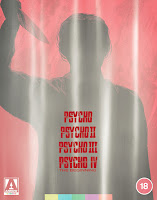Running Time: 109 Minutes, 113 Minutes, 93 Minutes, & 96 Minutes
Certification: 18
Starring: Anthony Perkins, Janet Leigh, Vera Miles, Meg Tilly, Diana Scarwid, Jeff Fahey, CCH Pounder, Henry Thomas, Olivia Hussey
From the shower sequence to the screeching use of strings, there is a good chance that your first experience with Psycho was through pop-culture references instead of watching the film itself. Many people know of Alfred Hitchcock's iconic masterpiece, although far fewer have seen the sequels. Enter Arrow Video, who have outdone themselves with a stunning physical media collection of the series entitled The Psycho Collection.
What more can be said about Alfred Hitchcock's influential masterpiece? 1960's Psycho adapts Robert Bloch's 1959 novel of the same name, as the story of on-the-run embezzler Marion Crane (Janet Leigh) sees her arrive at Bates Motel, run by shy proprietor Norman Bates (Anthony Perkins). From Bernard Herrmann's influential score to the iconic shower sequence, this is a masterclass in tension, editing, and subverting expectations. It may not need the overly explanatory ending, yet that does not stop this from being a monumental inclusion into the horror genre.
Released 23-years-later, Psycho II saw director Richard Franklin and writer Tom Holland take over for a story of Norman Bates' release from a mental institution after being deemed sane, something opposed by Lila Loomis (a returning Vera Miles). While making a sequel to a classic may seem like heresy, particularly when it opens by reusing the most famous element, the monochrome scene ending with colour entering the frame indicates that this will be a different beast entirely.
Returning to his old home, Norman's attempts to move forward with his life are troubled by torments from an unseen figure, leaving him to question his own sanity. Back in the lead role, Perkins is endearing as a Bates trying to live life as a better man. He struggles with his trauma, notably freezing up upon seeing a kitchen knife, and worries that others are trying to make him regress into being a mentally unwell murderer. On his side is Mary (Meg Tilly), a sympathetic co-worker who sees that Norman is genuinely trying to improve.
While the original broke ground by being the first film to show a toilet being flushed, this has moved on with the times to be a more sexually explicit and violent work. While editing may still be used to magnificently showcase the killings, this is an effective example of how cinematic sensibilities changed in-between the two films, something this work dives into rather fantastically. While there may be points where the story can feel overly complicated, this does not diminish the excellence of this work about the difficult hold mothers have over their children. What could have been a cheap cash-in is instead a compelling tale and a darn impressive follow-up.
Perkins moves behind the camera for Psycho III, a film which sets itself apart from the opening where a nun called Maureen (Diana Scarwid) loudly bellows "There is no God!" Her suicidal intentions result in a horrific accident which forces her to leave the convent, before being picked up by Duane Duke (Jeff Fahey). Events see the aspiring rock star and the distressed woman arrive at Bates Motel, where their paths cross with a considered rehabilitated Norman Bates, although the truth is far more sinister.
Once again perfectly capturing Norman, Perkins depicts the sweet exterior grappling with darker impulses as he embarks upon a new romance. This is fascinatingly new ground within a sleazier approach to the series, aided by a stylish direction which peaks with a vision of a nun. The many moving pieces can overload the film, taking routes unnecessary or too similar to the previous film, yet this is an interesting continuation where the lead character seeks independence from his inner demons.
Mick Garris takes over directorial duties for the last entry, Psycho IV: The Beginning. Within a radio station, DJ Fran Ambrose (CCH Pounder) hosts a show discussing boys who commit matricide. Calling in with personal experience on the matter, Norman Bates recounts his murderous history under anonymity.
Adopting a structure akin to The Godfather Part II, this film serves as both a sequel and a prequel to the story of Norman Bates, utilising flashbacks to include the earlier-set sequences. These allow more of an insight into the relationship between a living Norma (Olivia Hussey) and an abused young Norman (Henry Thomas). Hussey effectively captures the mother's vitriol that is excused as "love," with a rant about his birth being particularly heartbreaking, while Thomas is tremendous as the young boy who retreats into himself while a desire for cruelty lurks underneath.
The effects are evidently captured in Perkins' performance, as Norman remains shaken while trying to unburden himself from the tough past, yet this reflection adds to his fears of the future rooted in whether such bloodshed is in his genetics. It's a tale that has fun with callbacks to the original, although it can feel convoluted in conveniently explaining so much about Norman. The finale also feels unnecessary in how it reaches a physical confrontation, despite a similar point able to be made while not changing locations. Despite this, the film is a satisfying conclusion to Norman Bates' story that has thankfully not been followed up in convoluted fashion.
While the series may veer in quality, there are no bad films within The Psycho Collection, and Arrow Video have done a marvellous job in collecting this underrated horror franchise for a sleek physical media release.
The Psycho Collection is available now on 4K and Blu-Ray from Arrow Video
Psycho II
Psycho III
Psycho IV: The Beginning






Comments